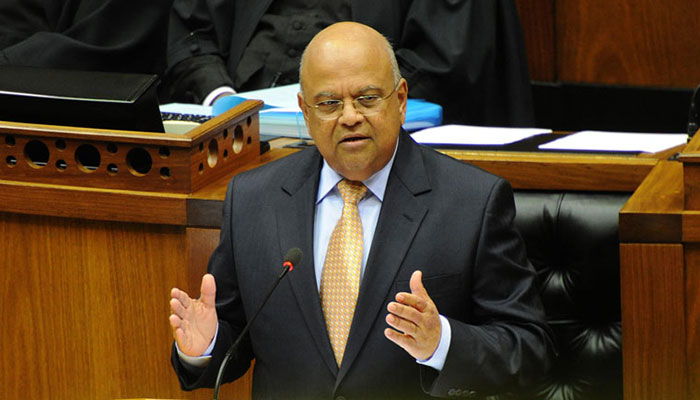web_pravin-gordhan_gcis_10439446966_4104640f87_o.jpg

Former South African finance minister Pravin Gordhan. Credit: GCIS
Speculation has abounded over the past week that Zuma, who many believe has been itching to fire Gordhan and has always resented his appointment, would finally pull the trigger.
Gordhan was well respected globally and seen as a trustworthy and reliable figure within a rocky administration dogged by allegations of corruptions. Predictions he could be ousted have been regularly accompanied by drops in the rand, reflecting investors’ nerves.
Gordhan’s removal came as part of cabinet-wide changes, which saw the positions of 10 ministers and 10 deputy ministers shuffled. Gordhan will be replaced by former home affairs minister Malusi Gigaba.
In a statement published today, the president said he revised his cabinet in order to “improve efficiency and effectiveness”, bring more young and female MPs to top government jobs, and drive “radical socio-economic transformation”.
But the significance of Gordhan’s removal will overshadow the move, which will be largely interpreted in the context of Zuma’s dislike of the former finance minister and as a bid to surround himself with political allies as his administration comes under fire for corruptiona and incompetence.
Since Gordhan was appointed to the role in 2015, the relationship between him, Zuma and Zuma’s allies in the ruling African National Congress party has been tense.
Zuma gave Gordhan the job reluctantly after his first choice, David van Rooyen, sent the country’s rand and stocks into a tailspin.
Since then, Gordhan has been perceived as a counterbalance to Zuma, who has worked to block a number of the president's initiatives and challenged him on issues such as corruption.
But this had consequences. Gordhan believes fraud charges brought against him last year, but later dropped, were “politically motivated” and Zuma’s dislike of Gordhan is well known.
Last week, Zuma suddenly ordered Gordhan to return to South Africa from London, where he was on the first leg of a two-day tour of the UK and US aimed at convincing investors to put their money into South Africa.
Zuma, who has denied there is a rift between him and the former finance minister, reportedly recalled Gordhan as he did not give permission for the trip. Obsevers however read it as a bid to test the market impact of Gordhan's impending dismissal.
Replacing Gordhan with Gigaba, a well-known Zuma ally, will give the president more control over a key brief.
But while the move has clear political benefits for the embattled Zuma, it also had immediate economic consequences.
The rand took its biggest weekly dive since 2015, sliding by more than 2.6% before recovering. Today’s drop takes this week’s fall to 8%.
Fears Zuma could look to up spending to bolster his popularity and that the country’s investment-grade credit rating could be at risk will add further strain to an already struggling economy.
Gigaba also seems ill-equipped to deal with the challenging economic situation he has inherited. While he has long-standing political experience, his background is in education and social policy, and has little experience of a finance or business brief.
Julie Beckenstein, head of sub-Saharan Africa country risk at analyst firm BMI research, noted that Zuma “knew very well” what the economic consequences of dumping Gordhan would be.
“The fact that he went ahead and did it anyway indicates he is far more focused on what’s going to happen politically within the country than the opinions of outside investors,” she said.
“This is basically a very calculated move by president Zuma in an attempt to increase his positioning within the party and power over the purse in the run up to [the ANC’s] national conference at the end of this year, when the party will choose a new leader.”
Any downgrade to the country’s credit rating, however, would hit the rand hard, she adds.












